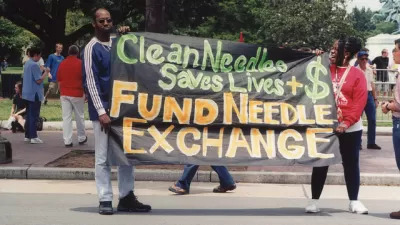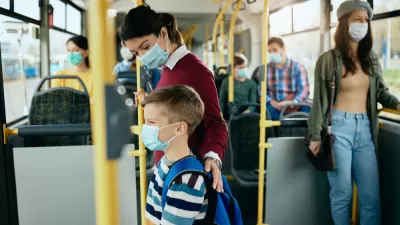Philadelphia was on the verge of approving a key harm reduction strategy to prevent fatal drug overdoses until the city council all but banned supervised injection sites, overriding a mayoral veto. A New York Times report explores the controversy.

“Nearly 110,000 people died last year of drug overdoses in the United States, according to preliminary federal data published on [May 17], a staggering figure that nonetheless represented a plateau after two years of sharp increases,” reported Noah Weiland for The New York Times on May 17.
The preliminary count of 109,680 overdose deaths was only slightly higher than the figure for 2021, when 109,179 people were estimated to have died, according to the Centers for Disease Control and Prevention. Overdose deaths had climbed significantly that year and the prior year, increasing by roughly 17 percent in 2021 and 30 percent in 2020.
[Related: U.S. Life Expectancy Continues Downward Trend, December 1, 2018]
Weiland adds, “Many of the interventions that the Biden administration has called for in a bid to reduce overdose deaths are loosely organized in a strategy known as “harm reduction,” which encourages the use of tools that make drug consumption safer.” Perhaps the most controversial are “supervised drug consumption sites, in which people are allowed to take illicit drugs under professional supervision,” though the degree of support by the Biden administration appears uncertain.
Philadelphia
The City of Brotherly Love disproportionately suffers from overdose deaths, having the nation's third highest per capita death rates among big cities in 2020, after Baltimore and Cleveland, according to data shown by Drexel University's Urban Health Collaborative.
Nearly six years ago, Planetizen posted that Philadelphia “Could Be the First U.S. City to Open a Sanctioned Safe Injection Site.” [Follow-up post on February 8, 2019: “Federal Government Intervenes to Halt Planned Supervised Injection Site in Philadelphia.”].
Last month
“Instead, it’s about to become the first major city to enact a near-total ban on such sites,” reported Nicole Leonard, a health and science correspondent for WHYY News, the city's NPR and PBS station, on September 14.
Philadelphia City Council passed legislation Thursday that will ban what are sometimes called overdose prevention centers in nearly all neighborhoods and city districts.
The proposed ban passed in a 13 to 1 vote, with Councilmember Kendra Brooks casting the single no vote. The legislation next goes to Mayor Jim Kenney for final approval.
Three days later, Leonard reported that “Philadelphia Mayor Jim Kenney called a plan to ban supervised injection sites across the city ‘troublingly anti-science and misleading.’”
Kenney announced [Sept. 17] he intends to veto legislation that would prohibit what are sometimes called overdose prevention sites, which allow people to bring and use illegal drugs under the supervision of professionals who can intervene and prevent fatal overdoses.
The following day the city council overrode the veto by the same 13-1 vote. It wasn't the first override of a mayoral veto by the council posted on Planetizen.
Today
To make sense of the ultimate rejection of a proven risk reduction (or harm reduction) strategy that saves lives, Weiland, a New York Times health correspondent, reports from Philadelphia on October 20 on the opioid epidemic in general and supervised injections sites in particular in the source article.
Public health experts have long endorsed a controversial strategy to blunt the opioid epidemic that has been sweeping cities like Philadelphia: supervised drug consumption sites, in which people are allowed to take illicit drugs under professional supervision.
The sites employ medical and social workers who guard against overdoses by supplying oxygen and naloxone, the overdose-reversing drug, and by distributing clean needles and other resources to opioid users. New York City has two sites, the only ones operating openly in the nation.
But then there are the politics of placing these facilities in people's neighborhoods.
But critics argue that the sites encourage a culture of permissiveness around illegal drugs, formally sanctioning opioid use in neighborhoods already struggling with high overdose rates.
In fact, advocating for safe injection sites can have an unintended effect. The sponsor of the measure to ban the sites, first-term Philadelphia City Councilmember Quetcy M. Lozada, has suggest an alternative:
She supports involuntary roundups [pdf] of opioid users, using the courts to route them to treatment facilities, a strategy that some public health experts have said is punitive and unproductive.
[Note passage of SB 43 in California this year in related post: “Election 2024: California Voters to Decide on $6 Billion Homelessness Bond,” October 18, 2023.]
What follows is a deep dive nationwide into these safe drug consumption sites, e.g., Gov. Newsom vetoing legislation in August 2022 that would have allowed some California cities to open supervised drug-injection sites as part of a pilot program intended to reduce fatal overdoses.
While the politics is controversial, Weiland writes that research has shown that “[s]upervised consumption sites have not led to upticks in neighborhood crime or community drug use...[a]nd they can save lives.”
Additional reading in The Conversation: “Philadelphia bans supervised injection sites – evidence suggests keeping drug users on the street could do more harm than good,” October 12, 2023.
FULL STORY: To Combat the Opioid Epidemic, Cities Ponder Facilities for Drug Use

Planetizen Federal Action Tracker
A weekly monitor of how Trump’s orders and actions are impacting planners and planning in America.

Maui's Vacation Rental Debate Turns Ugly
Verbal attacks, misinformation campaigns and fistfights plague a high-stakes debate to convert thousands of vacation rentals into long-term housing.

Restaurant Patios Were a Pandemic Win — Why Were They so Hard to Keep?
Social distancing requirements and changes in travel patterns prompted cities to pilot new uses for street and sidewalk space. Then it got complicated.

In California Battle of Housing vs. Environment, Housing Just Won
A new state law significantly limits the power of CEQA, an environmental review law that served as a powerful tool for blocking new development.

Boulder Eliminates Parking Minimums Citywide
Officials estimate the cost of building a single underground parking space at up to $100,000.

Orange County, Florida Adopts Largest US “Sprawl Repair” Code
The ‘Orange Code’ seeks to rectify decades of sprawl-inducing, car-oriented development.
Urban Design for Planners 1: Software Tools
This six-course series explores essential urban design concepts using open source software and equips planners with the tools they need to participate fully in the urban design process.
Planning for Universal Design
Learn the tools for implementing Universal Design in planning regulations.
Heyer Gruel & Associates PA
JM Goldson LLC
Custer County Colorado
City of Camden Redevelopment Agency
City of Astoria
Transportation Research & Education Center (TREC) at Portland State University
Jefferson Parish Government
Camden Redevelopment Agency
City of Claremont




























